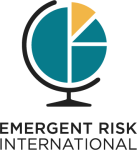OUR DATA PORTAL Emergent RiskIQ Login
Reflecting on Leadership during Disruptive Times

A note from the CEO
On a recent Monday morning I had a couple of terse emails waiting for me when I got to my desk. I dropped the ball on a couple of things the week prior, in one case hurting someone’s feelings with an offhand remark and in another, messing up travel plans because my mind was elsewhere when I approved it. I felt terrible. Importantly, I failed to fully communicate with my team what was happening in the background of my life that led to my distraction. As I rectified that with the team later I started thinking again about my responsibility as a leader to be authentic and honest with my team.
Obviously, I’m not the only one who has had a difficult year with family and friend related losses, inside this organization or elsewhere. Many of you reading this are likely going through your own similar struggles.
Bringing it into sharper relief, the last few weeks have been hard for many because of the intensity and personal nature of the conflict in the Middle East. Reflecting a pattern of major political security events made intensely real and traumatic through 24-7 media consumption, the conflict has overwhelmed even those without strong connections to Israel or Palestine. But for those in the risk intelligence and security field, most who cover the region will have very personal connections there – and it’s been an exhausting work pace. Here at ERI we have analysts working side by side who have family and friends on both sides of the conflict. And through it, they’ve maintained incredible professionalism and supported each other, even as they’ve worked overtime and on weekends to bring important intelligence and information to our clients who’ve been deeply impacted.
We will all experience illness, devastating loss, life altering events like the birth of children, divorces, anxiety, fear, anger – things that, negative or positive, take our minds off our normal day to day work and responsibilities. And yet, rarely is there the opportunity to quit our day job and fully walk away from our other responsibilities. When we decline to share with our teams that we are experiencing life-disrupting events, we also deny them the opportunity to see how their leaders and mentors manage their professional responsibilities, while also managing disruption and family duties. Moreover, when we are leading poorly because of such distraction and they don’t know why, they will draw their own conclusions. Information abhors a vacuum.
The ability to manage personal disruption at work- and work-related trauma is a major factor in people’s well-being. In a recent SHRM study, 60% of respondents said their work is the most significant factor in their mental health.
Nowhere is this more the case than in the security and care-taking professions: police forces, the military, healthcare, and many other professions where our day to day can bleed into our lives, increasing our risk of depression, anxiety and worse. You need only look at the number of military, healthcare, emergency services and police officers that take their own lives each year to know that this is the case.
So, at the risk of repeating myself. Take care of your people, but also, take care of yourself. No matter what it is you do for work every day. All work and all of life exacts a mental cost. The more we are honest and share the load with the people around us, the more likely they will do the same when met with their own difficulties – improving their support network and their ability to overcome these challenges – as well as yours.
Sign up for our Newsletter
ERI has offices in the United States, Singapore, the United Kingdom and Ireland. Want to know more?
